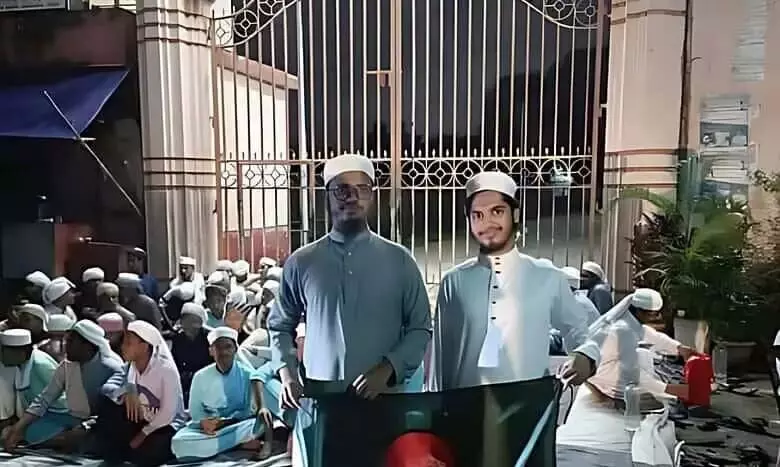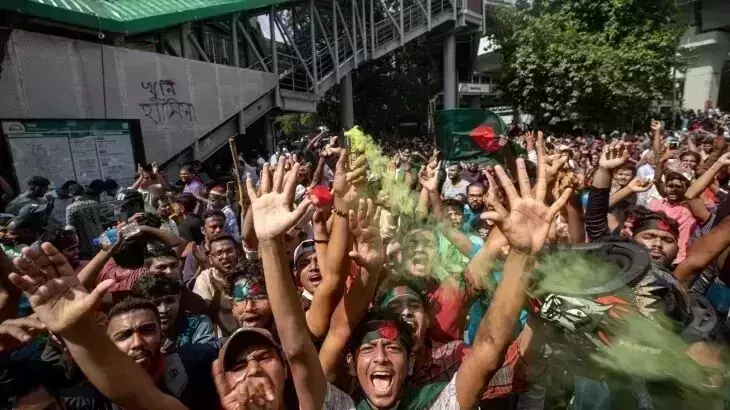
Trouble in neighbourhood and New Delhi
text_fieldsDhaka, the capital of Bangladesh, has become a happening city. Sheikh Hasina Wajid, who came to power for a fourth term last January and dealt with opposition voices and protests through the use of force, has relinquished power and fled the country as the popular uprising intensified. President Mohammad Shahabuddin, as part of efforts to bring the situation under control, dissolved the parliament on Tuesday, and assured that elections would be held as soon as possible and power would be handed over to a new elected government. In the meantime, the President also appointed Nobel laureate and founder of the microfinance movement, Muhammad Yunus, as the interim Prime Minister. The decisions, including the dissolution of the parliament, were made by the President after consultations with the heads of the three military branches, representatives of civil society, and leaders of student movements.
Since its birth in 1971, Bangladesh has experienced several phases of military coups and civilian rule led by generals. This time, however, the change in power is occurring due to an fierce popular uprising, which has resulted in the deaths of three hundred people in clashes. As such, there is no background of a military coup in the current upheaval. Khaleda Zia, who was the leader of the opposition party Bangladesh Nationalist Party (BNP) during Hasina's Awami League rule, has been released from prison during this period. Some of the leaders who were arrested between July 1 and August 5 amid the protests are also among those released. Families of former opposition leaders, both imprisoned and missing, had gathered in front of the intelligence office seeking information about their relatives. Among those released during this time are Abdullahil Amaan Azmi, the son of former Jamaat-e-Islami leader Ghulam Azam and a former army brigadier general, and Mir Ahmad Bin Quasem, the son of Jamaat leader Mir Quasem Ali who was executed during Hasina Wajid's rule.
Also Read:Sheikh Hasina flees country for safety as her residence is no longer safe
Given the historical ties between India and Bangladesh, it is natural for New Delhi to have a special interest in the events in Bangladesh. Moreover, India had a unique relationship with the ousted Hasina government. Immediately after leaving the country, Hasina arrived seeking temporary asylum on a Bangladesh Air Force plane at Hindon Airport, which is also a military airbase in Uttar Pradesh. Although the initial indications were that she would go to Britain from there, the UK has not so far come agreed to grant her asylum. It is believed that the obstacle is that rulers who leave the country following popular uprising are not eligible to seek asylum from outside Britain. One must apply for asylum to the first safe country they enter. Though by that position the ball may roll to India's court, Foreign Minister Dr. S. Jaishankar has stated that only a brief time and place have been allowed to the former Prime Minister. As such, observers speculate that the UAE or Saudi Arabia could be the destination for Hasina.
Also Read:Bangladesh interim government led by Nobel laureate to take oath tomorrow
If India's goodwill towards Hasina, who came to power through democracy but invited public anger through autocratic methods, continues, that will also have a bearing on the stance of the new government to take charge in Dhaka - despite the ongoing dependency on India in numerous spheres. It is expected that the Indian government will ensure secure bipartisan relations in the same prudent manner as indicated in its gesture of calling an all-party meeting to discuss the matter. At the same time, China has the potential to step in as an economic power to support Bangladesh. India shares a border of approximately four thousand kilometers, spanning Indian states such as West Bengal, Tripura, Assam, Meghalaya, and Mizoram - half of them in West Bengal. As revealed by the Foreign Minister in Parliament, there are 19,000 Indians in Bangladesh, including 9,000 students. Therefore, this is a time for diplomacy to be demonstrated in the most effective manner. The opposition has also expressed open support for the government's position on this matter.
 Also Read:Call to protect Hindu minorities’ lives, properties amid Bangladesh’s chaos
Also Read:Call to protect Hindu minorities’ lives, properties amid Bangladesh’s chaos
During the height of the popular protests, various forms of abuse have been reported. In many places, the readiness of Awami League activists to confront protesters alongside the army and police has led to political clashes. Reports indicate that around twenty Awami League leaders have been killed. In Bangladesh, where political instability is often exploited by communal forces, this pattern has been observed once again. To prevent such occurrences, student leaders and various religious-political organizations have come forward to protect the people. Political forces opposing the former government, such as the BNP and Jamaat-e-Islami, have also been involved in protecting Hindu temples by stationing their supporters at such places. They reminded the people that no room should be for dividing them into majority and minority and that those who are destroying Hindu homes and temples would be attempting to weaken the popular protests. Meanwhile, efforts to depict the Bangladeshi protests in a communal context are being pursued by anti-religious forces as well as extremist right-wing media and parties in India. It is wise to view popular protests against the government's autocratic acts as they are. Adding religious or communal color to these protests and attempting to spark discord out of them will benefit no one, a fact tose who believe in freedom and democracy will not fail to recognize.























